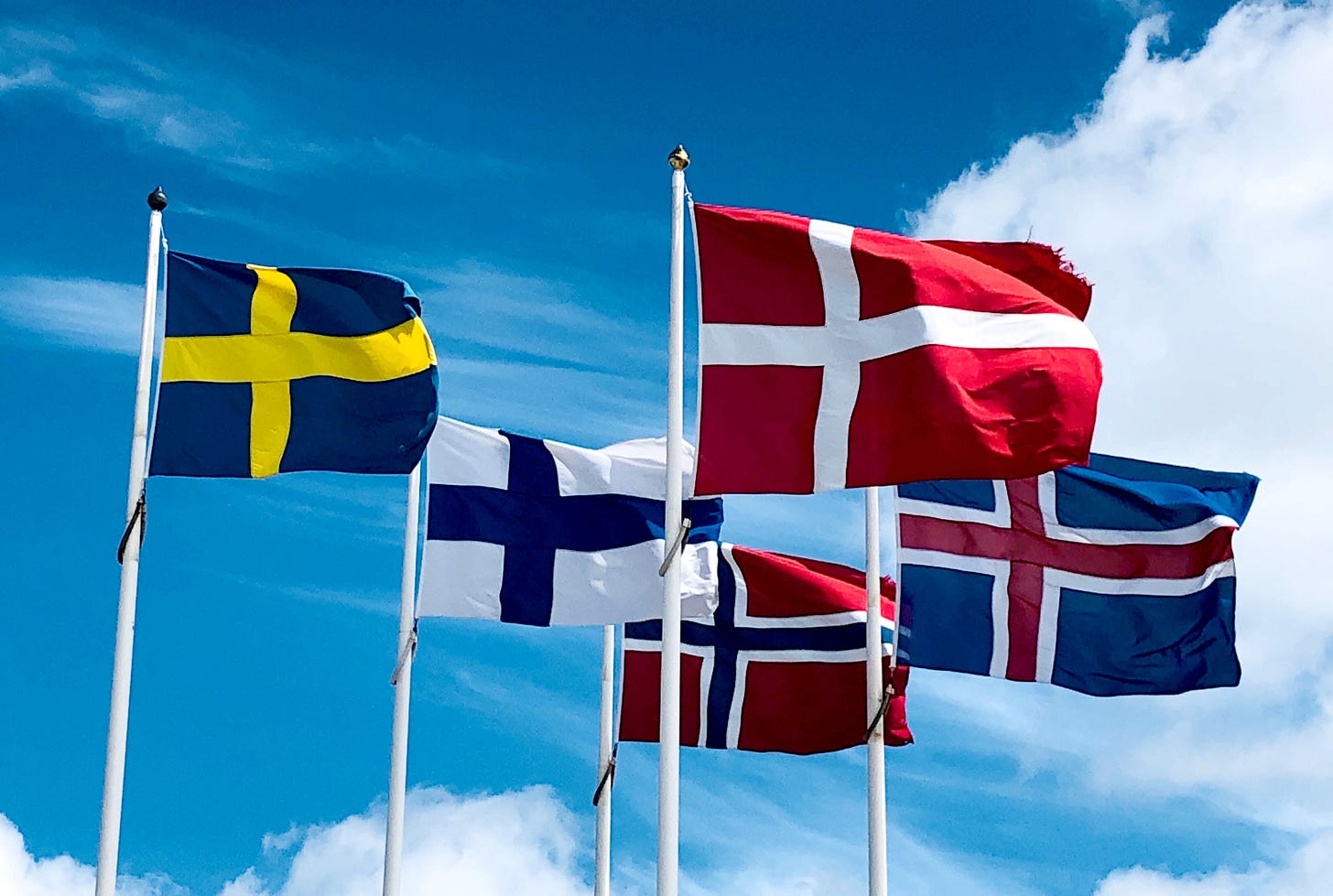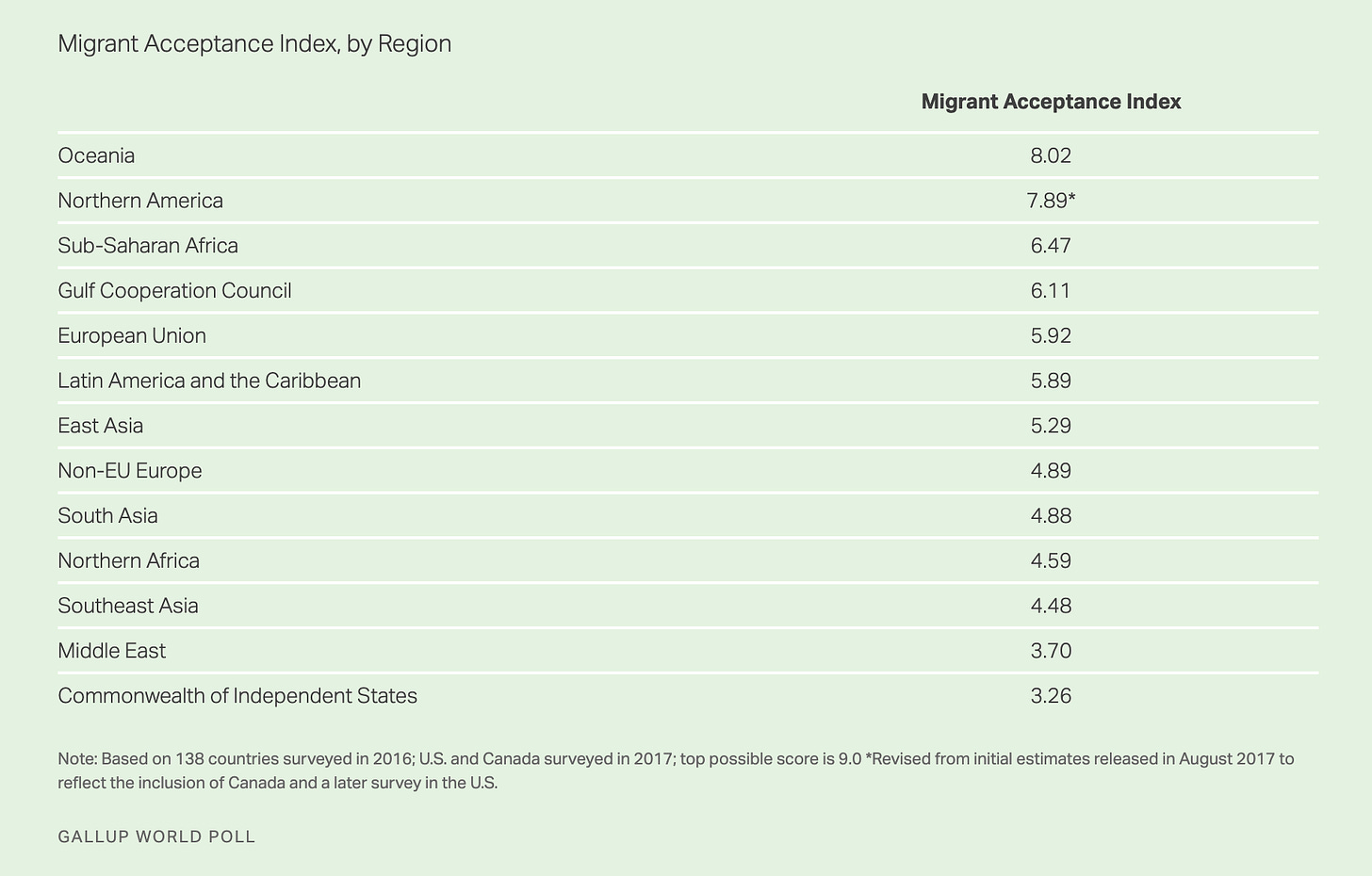
This post is by Contributor Johan Pregmo.
With its five weeks paid vacation, strong unions, maternity leave, and robust labor protections, Scandinavia would seem, to many in the US, like a socialist paradise. It’s part of a well-established mythology among American progressives that Europe is significantly to the left of the USA. Europe, in this view, is a shining beacon of what the US could be if they only had a larger welfare state. For the Europeans themselves, this narrative is a convenient way to scoff at our less evolved American cousins. “Sure they may be the world’s foremost economic, cultural, and military superpower, and yes, we depend greatly on them, but they don’t even have proper healthcare, and they have mass shootings every week! We may have our problems, but at least we’re not America!” “Their left is our center-right,” the line goes, “and their right is batshit crazy.” Although the latter may be true, the rest is a gross exaggeration verging on outright fiction. It’s become the “Napoleon Was Short” of our time.
This image of a progressive Europe is wrong. Not just mildly wrong, but deeply and fundamentally wrong. Even discounting Eastern Europe — notoriously regressive and corrupt — upon a closer view of the facts, the picture of Europeans as progressive paragons simply falls apart. The myth is perpetuated through sheer repetition and inertia. Everyone “knows” Europe is to the left of the US — and since everyone “knows” it, few bother to check if it's actually true.
American progressives pine for a society with universal healthcare and a strong safety net; where social security is guaranteed, racism is reduced, and conservative bigotry is kept far away from the halls of power. Likewise, the notion of a right-wing America is strong among Europeans, especially in my own country, Sweden.
Like many myths, there’s a kernel of truth — if our analysis looks only at the certain economic aspects of Nordic countries. But when we take a broader view, both politically and geographically, to nations such as Britain, Poland, Germany, France, and more — a rather different picture emerges.
If Europe was such an exemplar of progressive virtue, we would expect to see a powerhouse left-wing establishment. We would expect to see socialist or socially democratic parties dictating the pace of European politics. But that’s not what we see. Sweden’s Social Democrats, who were indeed once a dominant force, won less than 33 percent of the votes in 2022 compared to their 1968 high-water mark that pushed them over 50 percent — quite a feat in a crowded parliamentary system. Conversely, the center-right Moderates and far-right Sweden Democrats combine for nearly 40 percent. The last two elections forced coalition governments between left and right because neither could garner a majority to govern on their own.
France is no different, with its once-powerful socialist party in decline, Emmanuel Macron’s LREM — a neoliberal, centrist coalition party — remains the only serious challenger to the far-right National Rally, which scored high in the 2022 elections, and well ahead of the socialists. Britain, likewise, struggles to elect anyone at the moment, going through prime ministers at machinegun speed in recent years, and has not had a Labour leader since Gordon Brown, who left office in 2010. This was following the New Labour movement, which moved the party toward the center. The last Labour challenger to make any sort of play for power was Jeremy Corbyn, who was handily stomped beneath the clown shoes of Boris Johnson in 2019. In Germany, although the current Chancellor, Olaf Scholz, is a social democrat, his reign comes on the heels of the popular center-right Christian Democrat Angela Merkel’s 16-year dynasty. With the SPD — the German Social Democrats — at a meager 18 percent approval, Germany, too, does not seem particularly leftist.
All of this begs the question: what if the political Overton window is further left in Europe? If the European right is akin to the American center, and the European center is akin to the American left, isn’t it still fair to say that Europe is solidly to the left of the US?
While it’s true that the January 6th-style madness that has captured the American right is not commonplace across Europe (though Europeans do love them a good parliament brawl), populist-right parties have been gaining steam. Sweden wrestles with its far-right nationalist party, the Sweden Democrats; France has the National Rally; Britain has to contend with the legacy of UKIP, which drove the anti-immigration sentiment behind Brexit; Germany has its AfD; Poland has Confederation; and Italy has Fratelli d'Italia (“Brothers of Italy”, currently its single most powerful party). All of these parties are on the rise and forces to be reckoned with, displacing both center-right and center-left parties.
On matters of policy, let’s look again at Sweden, the darling of the US progressive movement. With the labor rights mentioned earlier, surely this country is well and fully to the left of the United States, right? Surely this is socialism actually working as intended?
Wrong. As much as Bernie Sanders claims he just wants a socialist system akin to Sweden — and don’t you know Bernie would be a centrist in Sweden, or even center-right? — the Swedish Social Democrats themselves don’t agree. Sanders is too far-left for them. They preferred centrist Dem Pete Buttigieg. Bernie’s idea of fully socialized healthcare is largely seen as radical even by Swedes themselves. Far from the misleading image of Sweden as a socialist utopia, it is, in fact, a highly privatized mixed market economy with strong welfare programs.
The Left Party — Vänsterpartiet, which is the only truly socialist party — enjoys a whopping 7.6 percent approval in the Riksdag, and lacks the political capital and influence to make their agenda happen. When we compare the center-left Social Democrats to the US Democrats, we don’t find any major differences. Both are concerned with social justice, social programs, and a reformist vision for society. What does it say when the most left-leaning country in Europe barely has a far left to speak of and rejects the policies of the most prominent left-wing American politician?
And here we arrive at the actual difference between Europe and the United States. This difference cannot be meaningfully measured on the left-right political spectrum. Even in aggregate; even ignoring the notoriously socially conservative Central or Eastern European countries (we haven’t even mentioned Hungary), European has broadly similar left-right politics to the US. The difference lies in Europe’s institutions. Americans have a large distrust of government, owing to tradition, history, culture, and past abuses, whereas institutional trust is higher across Europe. These are bureaucracies that have existed for hundreds of years, dating back to a time long before democracy. Europeans — varying by country, of course — have institutions and government services that not only work, but which predate the current political landscape by so long a span that they have become non-partisan, widely accepted, and to a degree, almost above politics.
The US, by contrast, has an unwieldy state apparatus governing large amounts of territory and hundreds of millions of people. The American system is weighed down by cumbersome and redundant layers of checks and balances, where the states squabble with the federal government while both contend with the cynicism of the citizens, the influence of commercial interests, and partisan attacks from the right. This makes for very different institutions — and very different attitudes toward them, compared to nations like Germany or France. It’s why a sizable portion of the US regards the entire concept of social spending as being a form of socialism (in either a good or bad way). No one in Europe thinks this way. Europeans find government assistance normal and unremarkable, because to us, it’s literally thousands of years old, dating back to the Roman grain dole in 134 BCE. Ancient Rome, those notorious Marxists.
The supposed gap between the Old World and the New is at its narrowest on the social values curve. To hear it from the American left, the US is a regressive hellhole where black people are mowed down in droves every day by bloodthirsty cops, where race relations have not really improved since the (18)60s, and where anyone mildly brown is crushed under the jackboot of white supremacy.
But viewed with a less glass-half-empty mentality, the facts tell a different story. In the span of 150 years, the US went from the most degrading form of chattel slavery to the broad acceptance of racial equality both before the law and in public opinion. Interracial marriage, once controversial, is now approved by a staggering 96 percent. Likewise, the US has become the largest and most diverse multi-ethnic democracy in history. It remains a favorite destination for immigrants coming to improve their lives. If the United States were really such a racist, backwards, basically-third-world hellscape, why do the world’s migrants — overwhelmingly non-white — risk life and limb to get inside? And why do 91 percent of Americans welcome them?

Europe, by comparison, is far from an enlightened paradise. Moored down by centuries-long national, religious, and ethnic grudges, and with a resurgent far right, its racial tensions are palpable. Sweden has a deeply segregated ghetto culture, regardless of its on-paper commitment to racial equality. The division between impoverished Middle Easterners and Africans compared to the white middle class is staggering. Germany, despite its Herculean reckoning with its past, still struggles with anti-Semitism. Poland too remains highly anti-Semitic. France is currently on fire in widespread race riots, and has a long and ongoing history of colonialism. The Brexit-fueled racism of the UK continues to this day. Italy is stripping same-sex couples of their parental rights. Hell, until 2013, Swedish trans people had to agree to be sterilized if they wanted to have their transition legally recognized. And across Europe, the Romani — also known as the Gypsies — are continually discriminated against. And let’s not even get into the vicious racial tensions of the Balkans, which have resulted in actual genocides.
None of this is to dismiss Europe as a racist dystopia, nor to uplift the USA as a beacon of perfect tolerance. All countries, no matter how progressive, will have troubled historical legacies and ongoing struggles with prejudice and discrimination. The point is that when viewing both sides of the Atlantic, the US and Europe are more alike than they are different. By the data, the US doesn’t appear any worse than Europe in terms of race relations; in fact, in some ways it looks better. Sure, Alabama probably isn’t coming out ahead of Sweden in terms of racial equality — but Swedes aren’t necessarily ahead of New York or California.
These are all broad strokes, of course. There is no other way to compare America’s 50 states to Europe’s 50 nations. The comparative newness of the US versus the deep roots of Europe creates a fundamentally different dynamic in some ways, but for all that, it’s hard to say one is definitely “ahead” of the other.
Both the US and Europe are stories of tremendous societal and cultural progress, complete with all its ups and downs. It’s all too tempting to sneer at the US as a European, because its presence is so overwhelming and culturally ubiquitous. Constantly bombarded with American media and American cultural attitudes, we’re reminded of the superpower across the pond at every turn, and it becomes very appealing to find some reason to look down our noses at this giant. Yet despite the stereotype of the American as egotistical, loud, obnoxious, and overly patriotic, are Europeans all that different? Nobody has a national ego like a Frenchman or a Brit, and the post-Napoleonic rise of nationalism has left no country untouched. We all have a past, and many of us are proud of it even when we shouldn’t be. Just how much of this contempt for the United States is legitimate, and how much of it is projection?
At bottom, this attitude is an easy way to dismiss our American cousins without having to deal with the substance of our differences.
Ultimately, the United States defines us all. We cannot escape it; it is the hegemon whose shadow looms long over the entire world. It is the Roman Empire of our time, but greater and more powerful, and as much as we may like to spit on it in condescension, it’s an unavoidable part of life — and we’re all better for it. The fact that the world’s biggest superpower is a liberal democracy matters. Europe and the US are alike not just in terms of historical and cultural heritage, but in our values as well. Rather than caricaturing each other — beyond the jocular ribbings everyone enjoys trading — we should emphasize, first and foremost, our commonality and shared interests.
See also: “Taking Heroes for Granted”
Subscribe now and never miss a new post. You can also support the work on Patreon. Please consider sharing this article on your social networks, and hit the like button so more people can discover it. You can reach me at @AmericnDreaming on Twitter, or at AmericanDreaming08@Gmail.com.






This is a very valuable article which I have not finished reading!
You in fact seemed pretty much to say exactly the things I said..Perhaps read your own blog….!
"The Brexit-fueled racism of the UK continues to this day". Which I'd say was and is complete rubbish, though some very strong Remain partisans wanted to paint this picture. (A few attacks in the street were misrepresented).
(I always find the dislike of Brexit by citizens of other nations quite amazing. Do American and Canadian citizens wish to merge their nations into a supranational political union? As the European Union undoubtedly is, for better or worse. Or even Indian and Pakistani citizens who regularly comment - nations that can't even seem to open more than a couple of land borders between them!).
"Europeans find government assistance normal and unremarkable, because to us, it’s literally thousands of years old, dating back to the Roman grain dole in 134 BCE. Ancient Rome, those notorious Marxists". In the UK at least, government assistance has been much more contentious and even at times somewhat stigmatised, than that comment implies.
There is no continuity between the Roman Empire and modern European states, and the modern bureaucracies that run them are in fact little, if any older than the US equivalents. If you aren't making that claim, I don't know why you even mentioned the Roman corn dole.
I think you are confused as well on socialism/ social democracy. Ok, it's confusing because words are used in very different ways and often just as attack terms by opponents (e.g. neoliberalism, Marxism, fascism). Socialism is mentioned a few times as if, rather like the word "Christian" is often used, it just means vaguely good, rather than a proven disastrous economic system, not least for the people it is supposed to be helping. If Bernie Sanders wants that, he's an idiot, but I suspect he probably does want something akin to a bigger welfare state - you'd know better than me about that.
Let's agree that Left and Right are fuzzy terms anyway, each country's history is different and it is easy to over-generalise. The big difference between the US and Europe used to be that the former was fundamentally an immigration society. However at the same time its former slave population was treated abominably, especially with the introduction of Jim Crow laws, and Europe has no institutional equivalent of that history, although of course it has racism.
Lastly, healthcare is an area where the US system is unambiguously to the "Right" of Europe, with a system that is both extremely expensive and non-comprehensive. The heated rhetoric and feeling over this in the States does seem very alien to the European debate, although we have our own problems in Britain, with the creaking, entirely state-run and funded NHS. And then there are those guns and mass shootings - I'm not going to make any glib comments about that because no doubt the reasons are complex. But the "Right" in the United States definitely are far keener on gun ownership than any equivalent in Europe.